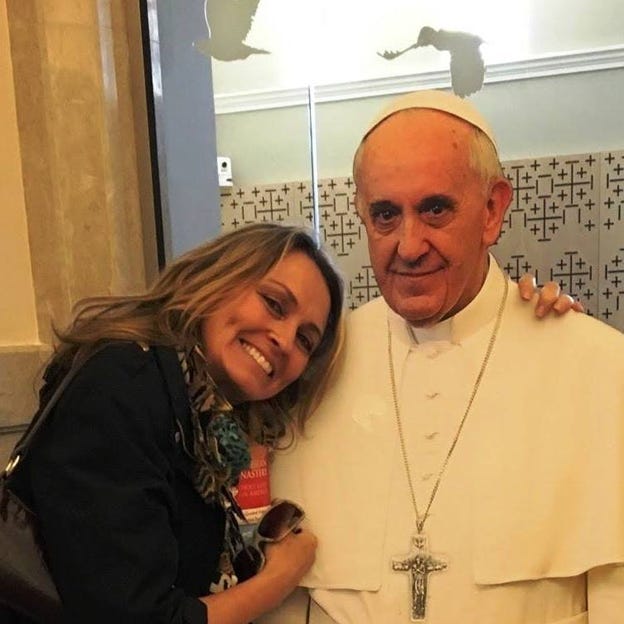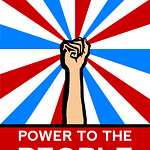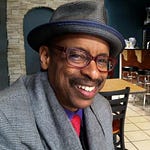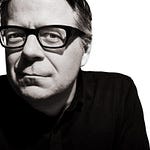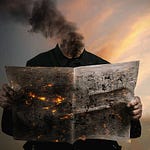vol. 3 issue 24
Greetings,
He demurs when I say it, but this podcast is my interview with our era’s equivalent to Galileo, Brian Muraresku.
Whereas Galileo challenged church doctrine that the Earth is the center of Cosmos — and so was put under house arrest until his death — Muraresku similarly has challenged church doctrine by connecting the dots across many specialties to convincingly argue that the Christian church is predicated on the Dionysian mystery cults for which hallucinogens were essential. (Of note: he had the Vatican’s help in doing so.)
The time stamps for this podcast are listed below if you want to get started listening right away. Otherwise, read on for more about this book and its author.
Muraresku spent nearly 15 years in search of this personal Holy Grail, a quest he scintillatingly recounts in his New York Times bestselling book, The Immortality Key: The Secret History of the Religion with No Name (St. Martin’s Press).
The relatively young classicist and practicing lawyer has illustrated that the mystery of Christ’s transubstantiation, known to Catholics and others around the globe as the holy Eucharist, is aligned with Greek Eleusinian and Dionysian mysteries where the “wine” of Holy Communion wasn’t an alcoholic beverage, but an herbal, psychoactive brew, known in Greek as pharmako.
Muraresku cites plenty of sources from the Antiquities indicating that drinking the special brew led to initiates experiencing a sort of rapture where they communed directly with the All beyond what is mortal, and found they no longer feared death. Further, through his impeccable research, Muraresku illustrates not only is there a through line of psychoactive substance use running from these ceremonial mystery rites, through the early secret cult of Jesus, to today’s psychedelic trials, such as the ones discussed in the previous episode of docu-mental, but that what has kept that line humming is the experience of divine communion.
But wait.
Muraresku has also rigorously connected the dots between scientific and other evidence to rightly interpret the Gospel of John to suggest the Church as it is today wasn’t exactly what Jesus had in mind. Instead, it was the plant “kingdom” and its administration by women — particularly mature women — of its mediating properties that were the rightful ones to bridge heaven and earth.
While Muraresku does not say this, I suggest in our interview that if what his scholarship points to is true, and I think it is, that makes the founding of the Church predicated on a lie.
That is to say, the Roman Catholic Church deliberately misinterpreted the Eucharist, paving the way for the linear hierarchies that have lead to today’s existential angst globally.
While I found the whole book exciting, I was particularly taken by Muraresku’s citation of an obscure Roman Eleusinian mysteries initiate, Praetextatus. It was he who successfully, if only temporarily, defended the mysteries from the Christian emperor Valentinian, who wished to end them in 364 (AD). Praetextatus claimed that the Eleusinian mysteries “[held] the whole human race together” and that life without them would be “unlivable”.
In the end, however, the Roman authorities eventually did do away with the mysteries, at least as they were administered in homes by women, typically the “grandmothers” of the group who had the correct herbal knowledge. Instead, the emperors et alia outlawed the priestesses, did away with the hallucinogens, and made it illegal to worship at home. Then they developed a male-only rite of the Eucharist which was wine without the psychoactive substances, and made it available only in the church.
In essence, the hierarchy domesticated the mysteries.
I suspect that through these mysterious rites, grounded in the worship of Demeter, goddess of grains and the harvest, the seeker Praetextatus had a vision that prophesied precisely where we are today. That is to say, by having domesticated the mystery, we have also domesticated the Goddess/Mother Nature, an act that has led to the increasing unlivable conditions on Earth, where the rate of extinction has wiped out nearly 60% of all global wildlife in the past half century, and climate catastrophes regularly now decimate the biosphere.
As docu-mental has covered in these past three years, this original act of domestication has now played out over the centuries not just as monolithic religious authority, but also as late-stage Capitalism, Socialism, Communism. It doesn’t matter what name it takes, it’s just one big story of how a pervasive authoritarian blob has seen to the perpetual enslavement of humans everywhere, whether literally or figuratively, oppressed by the top line who has all of the power, but ultimately takes care of itself, rather than show it feels a responsibility to any of the rest of us.
We feel it as anxiety and depression, a swelling of existential depression. The Earth feels it as death.
The Jesuit-educated Muraresku still avers his Catholic upbringing and admits that a globe full of faithful Christians is testament to there being something of God in the church. At the very least, it suggests that not everyone needs to use psychedelics in order to seek God.
And while I left organized religion years ago, and never fully felt committed to it when I was a part of it, I see beauty within it. I believe in the goodness of Pope Francis, and that if any modern era pope were ever to “get it”, it would be him. I also believe in the sincerity of many other ecumenical leaders. I certainly believe in the sincerity of those who find comfort within the church.
And yet, the hierarchy must go. It’s not real. It’s not what God, Goddess, All That Is, nor apparently even Jesus intended. And it’s killing us and our planet.
How it came to be that any human ever got a notion that it was okay to ever own another human being is a question for another day, but that itself seems in these pandemic times the real virus, the cancer of the mind. As I ask my guest in this interview: What is the point of having power over everything if the natural conclusion of doing so is the destruction of everything? Please don’t be so facile as to say that it will be at that moment rapture happens. I’m no biblical scholar, but neither am I simple. And neither is the answer to this question.
What is the solution, then? How do we engage with one another so that we can dismantle the deadly structures and create better ones that do not enslave us to them? So that we can allow the planet to evolve as Mother Nature intended, not obsessively bend her to our will?
We start by asking the question of what our actual heritage is as Americans. Is it Greek or is it Christian? And if as a democracy it’s Greek, why do we not insist on citizens having a classical education? Why are Latin and Greek barely taught in this country, and why do we know virtually nothing of the Antiquities which provide the moral foundation of our Constitution?
And I also think we might put ourselves in the shoes of those living during ancient times when slavery also existed, but so did the mysteries. Where might their civilization have evolved had hierarchy not usurped the fledgling spirit of true democracy? As has been pointed out by a previous docu-mental guest, American University associate librarian, director of research services, and Hellenic High Priestess, Gwendolyn Reece, PhD, equal justice — not enslavement — for all was essential for democracy to work.
It’s a perilous time, frankly. It’s a time when one of the most celebrated Historically Black Colleges and Universities, Howard University in Washington, DC, has just announced it is dissolving its Classics Department, as Muraresku reminds us in this discussion.
This is troubling not just because the black community has been at the forefront of leading this nation from its Greek and Christian roots, as evidenced by the writings of the Rev. Martin Luther King, Jr., who turned to Socrates as inspiration for his “Letter from Birmingham Jail”, but also because, as Harvard professor Cornell West wrote recently, “Academia’s continual campaign to disregard or neglect the classics is a sign of spiritual decay, moral decline and a deep intellectual narrowness running amok in American culture.”
Talk about “cancel culture”.
Without the classics to inform our soul, we might as well do away entirely with privacy, too. We won’t need our hearts, minds, and desires. We will be entirely at the mercy of the hierarchy.
My final thought on this is to share something Muraresku’s book elucidated clearly for me in my constant quest for what could bridge our current divide between soul and science.
By posing the question, as he does, as to why a society as highly sophisticated as the Greeks, who not only would discover and develop the foundations of today’s science, but who also were engaged in developing a democracy that, given a chance, might eventually have led to women and slaves being given the same rights as men, would also engage in the so-called silliness of gods and humans comingling.
The answer was in the mysteries. Put plainly, the Greeks had a very sophisticated form of spirituality that had the potential to work hand-in-hand with a democratic government to effectively balance heaven and earth. The silliness was the sublime.
I take that to mean that democracy would only work if the feminine principle was kept in balance with the masculine one — neither is more important than the other, just different.
Practically speaking, that means if we don’t respect nature and see her through the eyes of sustainability, democracy is moot. It’s impossible. The cycles of nature and the women who represented those cycles were the fulcrum of understanding we are part of a larger story, that we do not actually die when we die, that it was not the male-dominated church or any other hierarchical, linear construct that would ever make that truly possible.
As Muraresku himself suggests (p. 73 of the hardback version of his book), the bridge to the Great Beyond and back is only possible when the wild is in balance with technology. There is no one or the other. There is no hierarchy if we want to survive. There is only both at the same time, in balance. As Praetextatus warned us, the mystery is the only way.
Science. Mystery. Soul. Not science trumps soul. Not soul trumps science. There is only the integrated whole where all parts matter, regardless of their intrinsic nature. Hierarchy kills. Domination is deadly. Dominion, peace, and kindness, however, are not only possible, they are the only way to support life on earth indefinitely.
This is why at a time when psychedelic research is poised to make possible the scaling of their use for the masses, particularly for those who report existential depression, I hope enough of us will pause to ask better questions. Who should be in charge of these drugs? For what reasons? What does their power to deliver transcendence imply not just for individuals, but for the societies where individuals find themselves existentially troubled? Is it prudent to offer the power over these drugs to the very systems that perpetrate the existential depression?
I suggest it is only classically, critically educated minds that can skillfully ask such questions about where we’ve been and why, and whether where we are headed is in fact aligned with democracy.
To not rigorously challenge the status quo’s version of history —whether it is that of the Church, the corporation, or a political party’s line — will mean that with the re-emergence of psychedelics, we are ready to let the hierarchy insert itself between us and God all over again.
We might as well kiss democracy goodbye, and hope future generations will be lucky enough to have their own Galileo and aren’t so stupid as to let the moment pass.
Peace,
Whitney
The time stamps of this podcast:
0:00 Introduction
2:00 The “best kept secret in history”
4:10 The Road to Eleusis, by Carl Ruck, Gordon Wasson, Albert Hofmann, published in 1978: the first public statement about paleo Christian psychedelic use
7:30 The three pillars to the work: the Eucharist as a continuation of the pharmako and Dionysian mysteries; the Pagan continuity theory; and the idea that through the mysteries “We can die before we die so that when we die we do not die”
13:00 What does “blood of Christ” actually mean; the implied and literal cannibalism
15:00 The Gospel of John’s symbolic language for equating the Eucharist with the Hellenic Dionysian ceremonial mysteries; John 6:60
17:30 Dying before death (the immortality key), while also achieving communion with other worshipers, with God, and with the Earth
22:00 Today’s psychedelic drug trial participants overwhelmingly report that just one psychedelic experience is the most meaningful, spiritual one in their entire lives; what they report seems to mirror what occurred during the Dionysian mysteries.
24:00 The Roman Catholic Church usurps, and domesticates the mysteries “inserting” itself between the people and the pathway to know God
25:00 Psychedelics are a way to “die before death” so that death no longer becomes a fear because there is an understanding that when we die, we continue on in a different, non-material form
32:00 Why would the Greeks, the founders of democracy, of philosophy, of science, also have the soap opera-like tales of the Gods and not see any issues with integrating all three? Because they had access to the mysteries through the use of the pharmako, which we now call wine, but which was far more that just a wine as we know it today. It was more like the psychedelics of today.
34:00 The current crisis in our democracy is relevant when framed according to what the Greeks were able to achieve by being mature, spiritual adults who could work with the complexity of science, soul, and mystery.
34:30 The Gospel of John was an invitation to be both an initiate into the mysteries of Jesus/Dionysus, as well as a democratic participant in a society that was still developing democracy while also struggling with the question of slavery and inequality for women.
37:00 Praetextatus’ prophecy, which might have been a vision from the pharmako, now coming true: killing the mysteries, kills the planet.
39:00 The importance of not alienating humans from nature, the importance of kindness and group consciousness were demonstrated by the Dionysian mysteries. All of these things are essential to democracy, and are synonymous with health.
44:00 What would happen if we micro-dosed everyone on Capitol Hill? Would it grow our leaders up?
45:00 The importance of ritual as container for other-worldly experiences
48:00 Jesus sought to preserve, not domesticate, these mysteries, and was essentially the first heretic by urging his followers to worship in their own homes.
49:00 What is the true American heritage? Greek or Christian?
51:00 Greeks had democracy, science, and a very advanced sense of spirituality that accepted there is an afterlife. Classical education for our citizenry now would make this possible for our democracy now.
57:00 Fears of turning pharmaceutical companies into the next mediators of our capacity to touch the face of the divine.
59:00 The coming First Amendment challenges spawned by psychedelics.
1:01:00 The dangers of handing over power to the very systems that have for centuries been the ones to keep us “domesticated”.
1:04:00 Giving away the power to define what and how we experience the “immortality key” seals our fate as slaves to the System. Conversations like this one are what can alter that fate.
1:05:00 The importance of teaching how to be citizens through the classics.
Additional Resources:
Exterminate All the Brutes (hbo.com)
Howard University’s removal of classics is a spiritual catastrophe - The Washington Post
How Settlers Convinced Themselves They Were the First Owners of America ‹ Literary Hub (lithub.com)
Why you should care who controls psychedelics - docu-mental (substack.com)
Healing 'mind cancer' - docu-mental (substack.com)
Erratum: I mention in this episode that next week’s guest Acytua-bhava Das experienced about two dozen ayahuasca ceremonies. It was, in fact, over 100.




